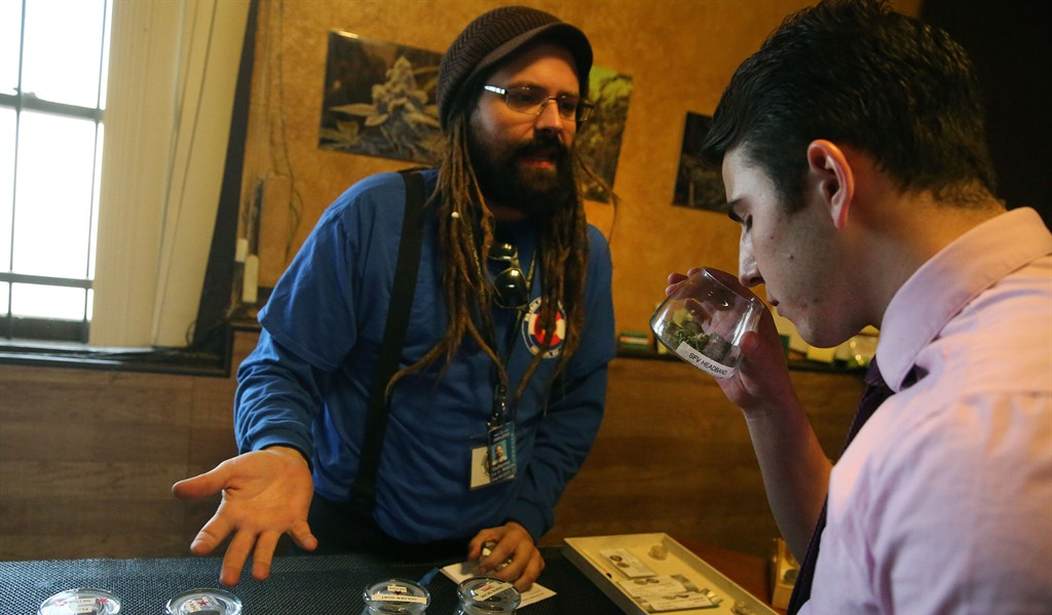There's a middle-aged woman at the counter nearby who could be your school librarian. On the opposite end of the dispensary, a slender young soldier in a wheelchair with close-cropped hair, dressed in his fatigues, consults with a clerk. There's a gregarious cowboy and an inquisitive pair of baby boomers looking at edibles. A dude in a hoodie walks in with his backpack.
And then there's my husband and me.
The dispensary is split in two: "recreational" on one side, "medical" on the other. Medical customers must have state-issued cards and doctor's approval. The inventory is not taxed, so prices are lower on that side. On the recreational side, where I'm peering at mysterious jars of prickly green goods, "Smoke on the Water" is thumping from stereo speakers. Yes, there's a massive banner advertising a Tommy Chong appearance, and issues of "High Times" are on display. But the many imposing signs posted on the wall emphatically warn: No smoking, no open drug consumption, and absolutely no entry allowed into the locked lab where the cannabis plants sit under bright lights.
Before I tell you how and why my hubby and I ended up at Marisol Therapeutics, some background about my longtime support of medical marijuana: More than 15 years ago in Seattle, while working at The Seattle Times, I met an extraordinary man who changed my mind about the issue. Ralph Seeley was a Navy nuclear submarine officer, pilot, cellist and lawyer suffering from chordoma, a rare form of bone cancer that starts in the spine. He had undergone several surgeries, including removal of one lung and partial removal of the other, and was confined to a wheelchair.
Recommended
Chronically nauseous from chemotherapy and radiation, weak from a suppressed appetite, and suffering excruciating pain, Seeley turned to marijuana cigarettes for relief.
Contrary to cultural stereotype, Seeley was far from "wasted." While smoking the drug to reduce his pain, he finished law school -- something he couldn't have done while on far more powerful "mainstream" narcotics, which left him zonked out and vomiting uncontrollably in his hospital bed after chemo. Seeley had the backing of his orthopedic doctor and University of Washington School of Medicine oncologist Dr. Ernest Conrad. He took his plight to the Washington state supreme court, where he asserted a constitutionally protected liberty interest in having his doctor issue a medical pot prescription.
The court rejected Seeley's case for physician-prescribed marijuana, arguing that the government's interest in preserving an "interlocking trellis" of costly and ineffective War on Drug laws trumped his right to individual autonomy and physician treatment. After a decade-long battle with cancer, Seeley died in 1998. But his spirit persevered. Seeley bravely paved the way for medical marijuana laws in nearly two dozen states, including Washington's Initiative 692, approved by voters 10 months after he died, and Colorado's Amendment 20, passed by popular referendum in 2000.
Support for these ballot measures and similar efforts (like the newly enacted Charlee's Law in Utah legalizing medical cannabis oil) transcends political lines. Why? Because cancer, epilepsy, multiple sclerosis and other chronic and terminal diseases have no partisan affiliations.
This brings us back to Pueblo. For the past three months, my mother-in-law, Carole, whom I love with all my heart, has battled metastatic melanoma. After a harrowing week of hospitalization and radiation, she's at home now. A miraculous new combination of oral cancer drugs seems to have helped enormously with pain and possibly contained the disease's spread. But Carole's loss of appetite and nausea persist.
A month ago, with encouragement from all of her doctors here in Colorado, she applied for a state-issued medical marijuana card. It still hasn't come through. As a clerk at Marisol Therapeutics told us, there's a huge backlog. But thanks to Amendment 64, the marijuana drug legalization act approved by voters in 2012, we were able to legally and safely circumvent the bureaucratic holdup. "A lot of people are in your same situation," the pot shop staffer told us. "We see it all the time, and we're glad we can help."
Our stash included 10 pre-rolled joints, a "vape pen" and two containers of cheddar cheese-flavored marijuana crackers (they were out of brownies). So far, just one cracker a day is yielding health benefits. Carole is eating better than she has in three months. For us, there's no greater joy than sharing the simple pleasure of gathering in the kitchen for a meal, with Grandma Carole at the head of the table.
Do I worry about the negative costs, abuses and cultural consequences of unbridled recreational pot use? Of course I do. But when you get past all the "Rocky Mountain High" jokes and look past all the cable-news caricatures, the legalized marijuana entrepreneurs here in my adopted home state are just like any other entrepreneurs: securing capital, paying taxes, complying with a thicket of regulations, taking risks and providing goods and services that ordinary people want and need. Including our grateful family.

























Join the conversation as a VIP Member